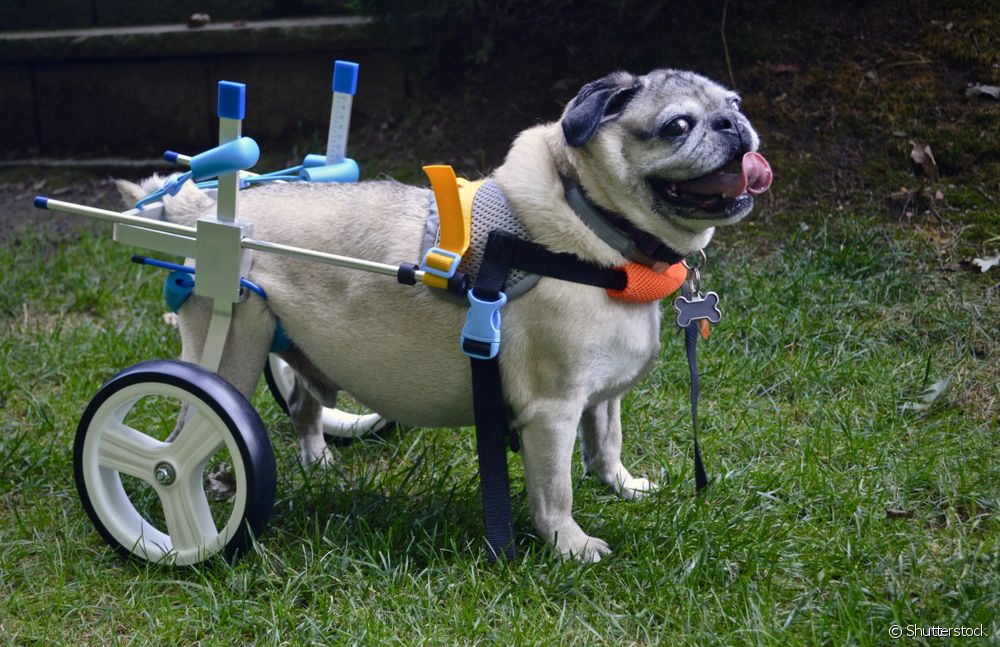Paraplegic dog: what is the most important care?

Table of contents
Living with a paraplegic dog or with reduced mobility is a situation that requires attention and specific care with the pet's routine. To begin with, it is essential to make an appointment with a veterinarian to understand the causes and assess the possibility of the animal recovering the movements of the paws. If it is confirmed that he will not walk again, some accessories - such as the cart for the pet - can be used.paraplegic dogs - can make your pet's life easier. Find out what are the main care for a pet in this situation!
Paralysis in dogs: what can cause it?
Have you ever stopped to think which diseases can leave the dog paraplegic? According to the veterinary orthopedist veterinarian Luiz Malfatti, the conditions that can cause paralysis in dogs are:
See_also: Does your cat eat cockroaches and other bugs? See what the dangers of this cat habit are and how to avoid it- Degenerative myelopathy
- Distemper
- Anger
- Meningitis
- Spinal injuries (hernias or trauma)
In addition, sudden paralysis in dogs is another possibility. In these cases, the veterinarian clarifies that botulism and polyradiculoneuritis are conditions that usually leave the animal momentarily paraplegic. See the explanation for each of the diseases:
Botulism: "food poisoning in dogs caused by a bacterium called Clostidrium Botulinum. The toxin ingested, usually from raw, garbage or even spoiled food, is absorbed by the animal's stomach and intestines and distributed in the bloodstream."
Polyradiculoneuritis: "progressive paralysis caused by acute inflammation of the nerves".
My dog suddenly stopped walking, can he regain movement?
This is another common question when the guardian notices that the dog has stopped walking from one hour to the next. Regarding the return of mobility, the veterinarian points out: "Everything will depend on the dog's condition. Spinal injuries can often be treated both conservatively and surgically and show improvements. Other more serious injuries or with a delay in diagnosis and treatment may be more difficult to treat.no turning back".
To find out if the paraplegic dog can walk again, it is essential to consult a trusted veterinarian who understands the subject. There are chances for the puppy to regain movement, as long as the condition is diagnosed and treated properly. "In cases of herniated disc in dogs, surgery can be performed to decompress the herniated disc. Some less severe casescan also be treated with physiotherapy and veterinary acupuncture".

4 most important care for a paraplegic dog
1) A dog wheelchair can improve your pet's quality of life. With it, your puppy will have more autonomy to move around without depending on you. Still, it is important to remember that the animal should not spend the day with the chair - the recommended is to stay, at most, two hours with the accessory and always supervise.
2) A car seat for a paraplegic dog is not always recommended. If your dog's case is not too severe and there is a chance that he will walk again, the dog wheelchair is not indicated because it can make it difficult for him to get around again.
3) Dog hygiene needs special attention. Paralyzed dogs often have a harder time going to the bathroom and need a helping hand from their owners, so you should pay extra attention to your friend at this time to help him.
4) Adapting the house is an important precaution. If you have a paraplegic dog and live in a place with more than one floor, or with "restricted" areas, be sure to install a dog gate in these places. This way you prevent accidents from happening.
See_also: Kitten overcomes the challenges of cerebellar hypoplasia, a rare condition that affects balance and paw movement

